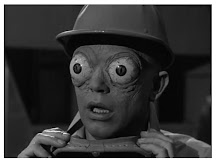Well, in my anti-vax movement post, I wanted to impress more the fact that vaccines do not cause autism, so not vaccinating your child and putting him or her at risk because you think it might give them autism is not an excuse, let alone a good one.
Of course, mind you, if your child does have a sensitivity to vaccines then that is a problem. I actually remember a booster shot I got some time in middle school, the nurse warned it might make me a little woozy but I had a damn fever for the rest of the day. Other than that I seem to be fine with shots other than not liking needles AT ALL. But I've know people to have reactions ranging from mild to quite severe and it's not that vaccines are completely safe for everyone, it's that they are more than likely not going to cause your child to develop autism.
Well, the real question here is, instead of blaming vaccinations, what actually DOES cause autism?
Well, it would seem that it's kind of up between genetics and environment. By environment I mean your living conditions, of course, but in the womb and out...like say if your mother drinks or smokes while she's pregnant with you. Of course, drinking, smoking & drug use can cause a host of problems because that's BAD DAMNIT.
But what about genetics? I just so happened to stumble on this BBC article that says studies are being done & results are showing that a certain gene may have a role in autism & surrounding conditions (like Asperger's Syndrome for ex)
Genes 'have key role in autism'
Scientists have produced the most compelling evidence to date that genetics play a key role in autism.
They highlighted tiny genetic changes that appear to have a strong impact on the likelihood of developing autism and related conditions.
The changes influence genes which help form and maintain connections between brain cells.
The Nature study highlighted one common genetic variant in particular which, if fixed would cut cases of autism by 15%.
Previously, other genetic variants have been linked to autism, but they are all relatively rare.
Dr Raynard Kington, of the US National Institutes of Health, which funded the research, said: "These findings establish that genetic factors play a strong role in autism spectrum disorder (ASD).
"Detailed analysis of the genes and how they affect brain development is likely to yield better strategies for diagnosing and treating children with autism."
People with ASD, which include autism and Asperger's syndrome, have problems with social interaction, poor communication skills and tend to engage in repetitive behaviours.
In the latest studies researchers scanned the human genome for small differences between people who have an ASD, and those who do not.
The largest study, led by the University of Pennsylvania, focused on more than 10,000 people.
And again, it's not concrete, but really I'd rather focus on what does cause autism rather than what doesn't.


